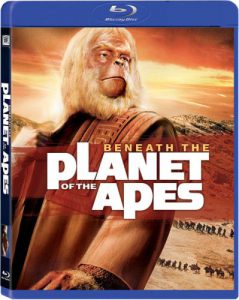This series celebrates 50 years of the “Planet of the Apes” film franchise. Here, we look back at the second film in the original series.
Despite common misconception, “Planet of the Apes” (1968) does not reveal that nuclear warfare knocked the humans back a peg; that’s what Taylor (Charlton Heston) guesses, but it’s not confirmed until the second entry, “Beneath the Planet of the Apes” (1970). The underground mutant bomb worshippers peel back their false faces to reveal their true radiation-scarred visages. They worship The Bomb as if it’s a god (this film could’ve been subtitled “How Humans Learned to Stop Worrying and Love the Bomb”), and indeed, a genetic effect from the bombs has given them telepathic and mind-control abilities.
From this point forward, director Ted Post’s film is a biting commentary on U.S. war policy of the time – and unfortunately, of all time. One of the mutants, Ongaro (Don Pedro Colley), tells Taylor and fellow 20th century astronaut Brent (James Franciscus) that they do not kill their enemies, they get their enemies to kill each other. He then uses his telepathy to force the friends to fight. Ongaro’s hollow moralizing has an echo of U.S. imperial policy, which has flooded the Middle East with weaponry and turned it into a perpetual warzone.
Even darker: Taylor is the saga’s moral authority, commenting on the human tendency toward self-destruction throughout the back half of the first film and throughout this one, but he’s the one who presses the plunger that blows up the world-busting Alpha Omega bomb. “Beneath” reminds us there’s nothing more dangerous than a man with nothing left to lose.
Taylor has lost Nova (Linda Harrison) in the gorillas’ storming of the mutants’ city. She is more than just a mate, but in fact a ticket to repopulating the Earth with intelligent humans. Writer Paul Dehn draws from Pierre Boulle’s novel when Taylor surmises that if he and Nova had a child, he could teach it to speak. Indeed, Nova’s first and last word is “Taylor,” proving him right.
He has also lost his ally Brent in the shootout, and Dr. Zaius (Maurice Evans) is on hand to taunt him one last time about how awful humans are. It’s interesting that Taylor and Zaius actually agree on this point, but they still hate each other’s guts. I think it’s because Taylor resents Zaius’ collectivism when it’s directed at him. So in the ultimate “f— it” moment, a fatally injured Taylor proves Zaius right and destroys the Earth. Taylor loses the argument, but no one is left to record that fact for posterity.
Not that the apes are anywhere close to morally pure. Dehn again draws from Boulle’s book when he shows gorilla military leader Ursus (James Gregory) speechifying for war with the mutants. Paralleling how the U.S. executive branch operates (not how it is supposed to operate, under the Constitution), Ursus is not so much advocating for a war as he is simply announcing it. While the gorilla military works itself into a froth, the orangutans and chimpanzees (imagine the courts and Congress) just sit there. But when Ursus demands they join the cheering, they dutifully stand up.
In execution, “Beneath” is rickety by today’s standards, although in the pre-home-video days, it was more forgivable to repeat elements of the saga’s previous entry. “Beneath” begins with the final moments of the original film. Then the first two acts are a matter of Brent learning about this world, so he can get caught up with the viewer. Brent and Nova go through the same travails – captured by apes, then escaping – that Taylor and Nova did. The action sequences are a step down from the original. The creature effects are good, but not quite as good as they had been.
But I have a soft spot for stories about underground worlds and civilizations (see also “Journey to the Center of the Earth,” “The Night Strangler,” the underworld of Coruscant in “Star Wars” Legends, and the episodes of “Futurama” that parody this sci-fi cliché), so I find “Beneath” gets intriguing when Brent and Nova explore the ruins of New York City. It makes no logical sense. How is a roof formed over the city? How is it stabilized? While the film has no answers, it gives a nod to the mystery with the mutants’ worshiping of “the firmament” in the grand ceremony where we see how Western religions have morphed into this bomb-worshiping spinoff.
Of the two warring factions, though, it is noteworthy that the apes are the aggressors and the mutants (the hypocrisy of the forced Taylor-Brent fight aside) try to use illusions to stop the attack. They aim to live peacefully, in isolation from the aboveground apes, and they believe their god – The Bomb – will protect them. There is a kernel of truth to this, certainly, as the promise of mutually assured destruction is a big reason why the world hasn’t been destroyed yet. More broadly, the projection of global military might is a big reason why the U.S. mainland is rarely attacked.
But “Beneath” reminds us that this approach is inherently unstable, because drone bombings — which often kill civilians and have caused Middle Easterners to fear the sky — creates more and more enemies who have nothing left to lose. It may not be quite as final as what we see in “Beneath the Planet of the Apes,” but the inevitable end result is that this delicate balance gets blown all to hell.


